外研版(2019)选择性必修第二册Unit 3 Times change! Developing ideas课件(共47张)
文档属性
| 名称 | 外研版(2019)选择性必修第二册Unit 3 Times change! Developing ideas课件(共47张) |

|
|
| 格式 | pptx | ||
| 文件大小 | 2.9MB | ||
| 资源类型 | 教案 | ||
| 版本资源 | 外研版(2019) | ||
| 科目 | 英语 | ||
| 更新时间 | 2024-11-17 10:00:05 | ||
图片预览

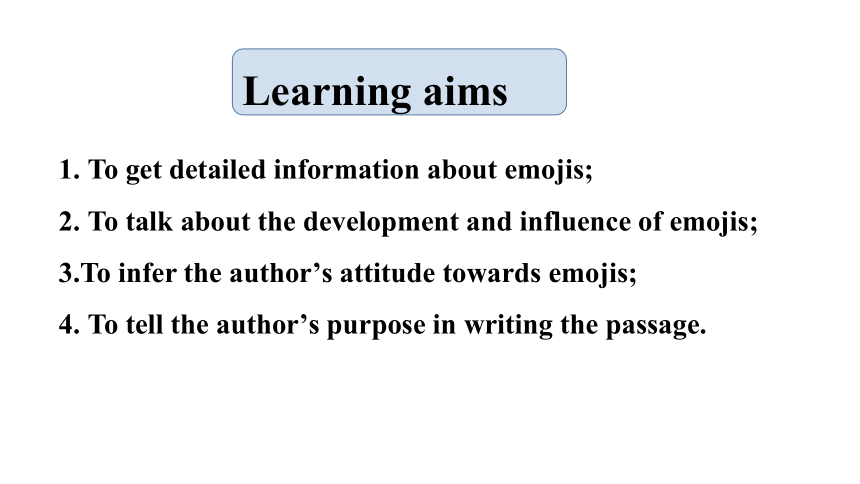
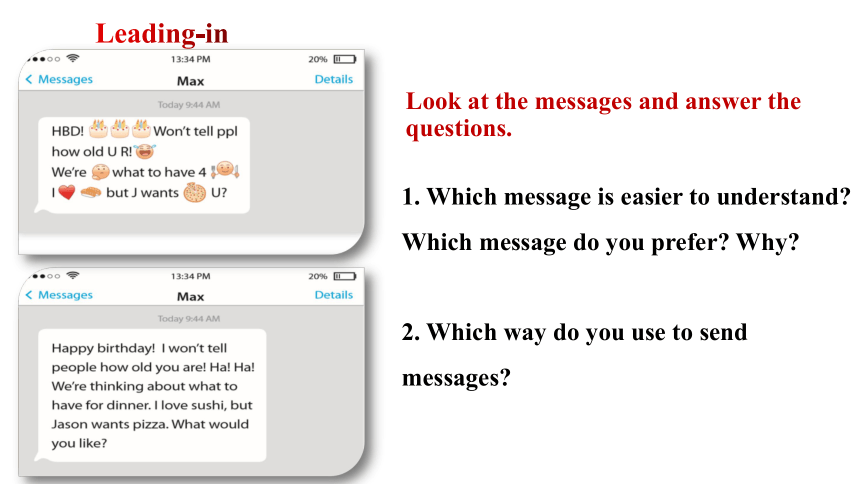
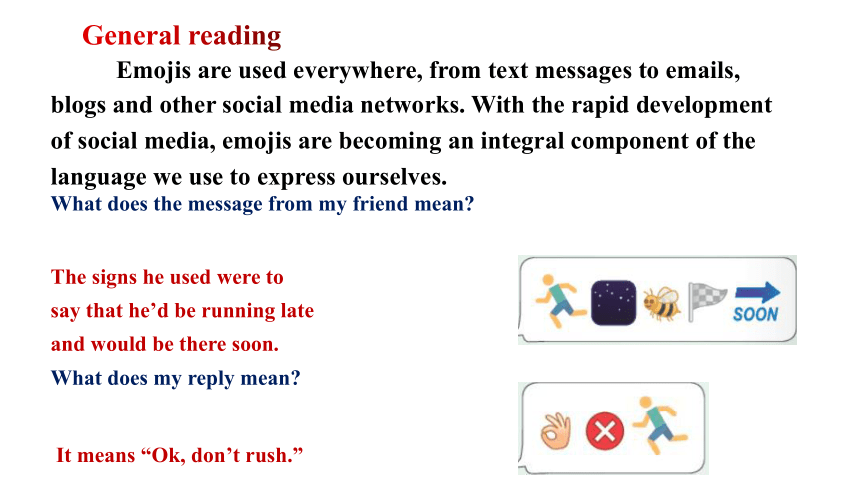





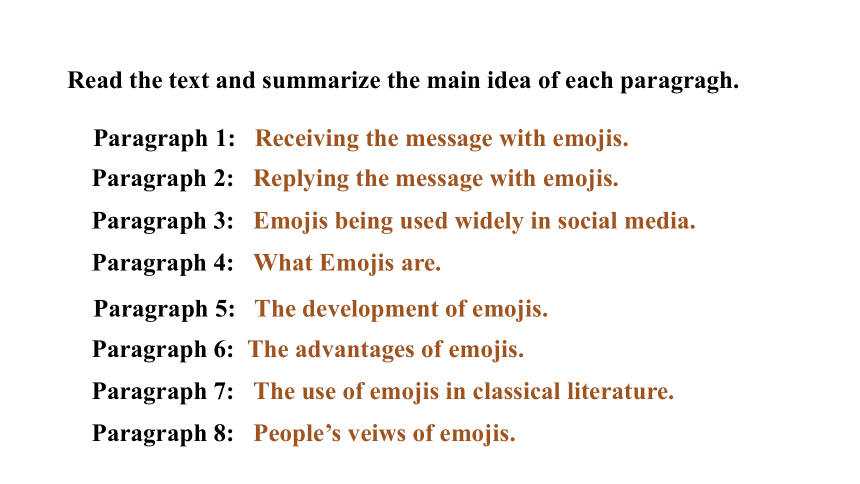
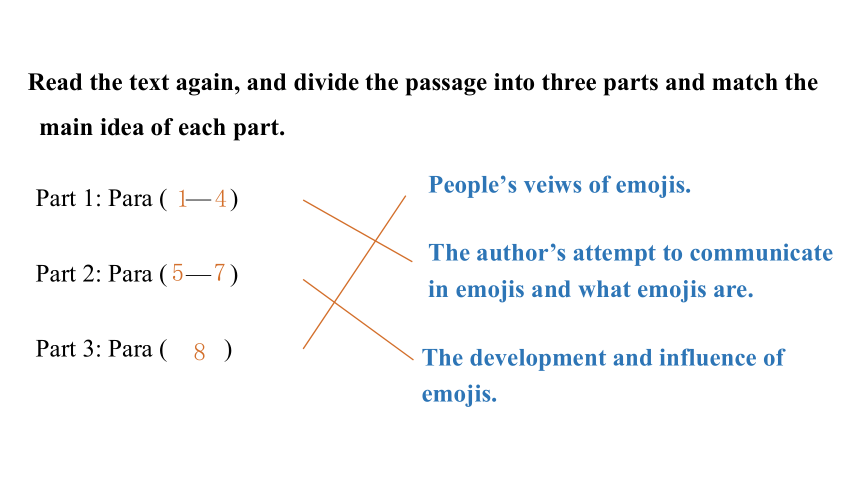

文档简介
(共47张PPT)
Times change!
Unit 3
Emojis:
a new language
Learning aims
1. To get detailed information about emojis;
2. To talk about the development and influence of emojis;
3.To infer the author’s attitude towards emojis;
4. To tell the author’s purpose in writing the passage.
Look at the messages and answer the questions.
1. Which message is easier to understand Which message do you prefer Why
2. Which way do you use to send messages
Leading-in
Emojis are used everywhere, from text messages to emails, blogs and other social media networks. With the rapid development of social media, emojis are becoming an integral component of the language we use to express ourselves.
What does the message from my friend mean
The signs he used were to
say that he’d be running late
and would be there soon.
What does my reply mean
It means “Ok, don’t rush.”
General reading
1. What does the word “emoji” come from and what are “emojis”
The word “emoji” comes from Japanese , literally meaning “ picture character”.
Emojis are small symbols representing ideas, emotions or feelings. They come in different categories, such as faces and people, plants and animals , and food and drink.
Specific reading
2. The development of emojis:
In 1999, there were only 176 simple designs.
Now , there are more than 3,000 emojis that expand upon the way in which we communicate.
Due to their popularity, the Oxford Dictionaries Word of the Year in 2015 was , for the first time ever, a pictograph instead of a traditional word.
The popularity of emojis:
3.Why do people like emojis
It seems that emojis have clear advantages over written language. Because they add emotional meaning, and are quick and easy to use.
This is similar to the gestures we use when we speak.
Emojis can also help people express their feelings when they cannot find the appropriate words.
4.The use of emojis has even spread to classical literature.
Advantage:
For example: A Shakespeare series for young readers has taken William Shakespeare’s popular plays and replaced some words with textspeak and emojis.
The intention of these adaptations is to make the classics more accessible to young readers.
Disadvantage:
These new versions have taken away the heart and soul of Shakespeare’s plays.
Paragraph 1: Receiving the message with emojis.
Paragraph 2: Replying the message with emojis.
Paragraph 3: Emojis being used widely in social media.
Paragraph 4: What Emojis are.
Paragraph 5: The development of emojis.
Paragraph 6: The advantages of emojis.
Paragraph 7: The use of emojis in classical literature.
Paragraph 8: People’s veiws of emojis.
Read the text and summarize the main idea of each paragragh.
Part 1: Para ( — )
Part 2: Para ( — )
Part 3: Para ( )
1
The author’s attempt to communicate
in emojis and what emojis are.
The development and influence of emojis.
4
5
7
8
People’s veiws of emojis.
Read the text again, and divide the passage into three parts and match the main idea of each part.
Choose the author’s purpose in writing the passage.
1. To guide readers to use emojis properly.
2. To discuss the development and influence of emojis.
3. To criticise the increased use of emojis.
4. To entertain readers with examples of how emojis have been used.
5. Emojis’ s future
One day, perhaps emojis will have become a real pictorial “language”.
Emojis have a tendency to pop up all over the place.
But this makes others, especially educators, worry that we are losing the ability to communicate properly using the written word, or even the spoken word.
Perhaps people will one day choose to communicate in pictures, and forget how to write properly. What’s your opinion
Perhaps people will one day choose to communicate in pictures, and forget how to write properly. What’s your opinion
Evidence:
Reasons:
When you give your opinion, your argument will be stronger if it is supported by evidence. Evidence can come from primary sources, such as original documents and interviews, or secondary sources, such as books and magazines
1. Emojis can lead to confusion.
2. Emojis can only express a very limited amount of meaning.
3. Emojis are not suitable to use in specific situation.
1. The emoji that illustrates two folded hands.
2. Writing allows us to communicate abstract concepts.
3. Interview.
Reasons
Evidence
Reasons
Evidence
1. Using emojis frequently.
2. Expressing feelings with emojis more simply and clearly.
3. Emojis are an international language.
1.Over 6 billion emojis are sent on a daily basis, with over 90% of the world’s online community making regular use of them.
2. Enriching text with facial expression.
3. They can be easily interpreted.
What do you think about the way people use emojis
1.expand vt.& vi.增加,(使)扩大
(教材原句)Now there are more than 3,000 emojis that expand upon the way in which we communicate.现在有超过3 000个表情符号详细描述了我们的交流方式。
(2023·全国乙卷)One in four adults say that TV chefs have made them much more confident about expanding their cookery knowledge and skills, and young people are also getting more interested in cooking.四分之一的成年人表示,电视厨师让他们对扩展烹饪知识和技能更有信心,年轻人也对烹饪越来越感兴趣。
The narrow path in the village expanded into a wide road.
村里的狭窄小路拓宽成了一条大道。
Metals expand when they are heated. =Metals undergo expansion when they are heated.
金属受热会膨胀。
【知识拓展】
(1)expand on/upon 详述;详细阐明
expand into 扩大成
(2)expansion n. 膨胀;扩张
【即学即练】单句语法填空
(1)Would you expand the matter a little further
(2)His modest business eventually expanded a supermarket empire.
完成句子
(3)他没有详细阐述他的报告。
He didn't .
(4)那位作者把他的短篇小说扩展为长篇小说。
The writer .
expand greatly on his statement
on/upon
into
expanded his short novel into a long one
2.intention n.意图,目的;企图,打算
(教材原句)The intention of these adaptations is to make the classics more accessible to young readers.
这些改编的目的是让年轻读者更容易理解经典名著。
He queued up for a whole day, with the intention of getting a ticket to a jazz concert.
为了能买到一张爵士音乐会的门票,他排了一整天队。
But when Dennis Williams received a text that clearly wasn’t intended for him, he did something special.
但是当丹尼斯·威廉姆斯收到一封显然不是发给他的短信时,他做了与众不同的事。
【知识拓展】
(1)with an/the intention of 抱有……的目的;打算……
have no intention of doing sth. 无意做某事
(2)intend vt.打算;计划;想要;意指
intend to do/doing sth. 打算做某事
intend sb. to do sth. 打算让某人做某事
had intended to do sth. (=intended to have done sth.)本打算做某事(但事实上没做)
(3)be intended for/to do sth. 旨在,预定……用途;为……打算(或设计)的
【即学即练】单句语法填空
(1)He wrote the letter with the (intend) of asking for some advice.
(2)The university is known for its language and culture courses (intend) for international students.
(3))New Concept English (intend) for foreign students, which is known to us all.
完成句子
(4)我不打算让你继续独自生活在这里。
I you to continue living here alone.
is intended
intention
intended
have no intention of allowing
3. adaptation n.改编;改编本;适应(性)
(教材原句)The intention of these adaptations is to make the classics more accessible to young readers.
这些改编的目的是让年轻读者更容易理解经典名著。
The expert is giving a lecture on the adaptation of desert species to the hot conditions.
这位专家正在做关于沙漠物种对炎热环境的适应性的讲座。
Farmers already adapt to variable weather by changing their planting schedules.
农民已经通过改变种植计划来适应多变的天气。
【知识拓展】
(1)make an adaptation to 适应……
(2)adapt v.使适应;使适合;改编;改写
adapt (...) to(使……)适应于…… adapt (...) from根据……改编(写)……
adapt...for把……改编(写)成……;为……改编(写)……
(3)adaptable adj.可改编的;能适应的
【即学即练】单句语法填空
(1)Successful businesses are highly (adapt) to economic change.
(2)It was a TV (adapt) of Chinese literature classic, The Dream of the Red Chamber, which was performed by a group of children aged 6 to 12.
(3)It took him a while to adapt himself his new surroundings.
adaptable
to
adaptation
4. tendency n.倾向,偏好;趋势,趋向
(教材原句)As we can see,emojis have a tendency to pop up all over the place.
正如我们所看到的那样,表情符号大有随处可见的趋势。
Some think that a woman's body cells have a tendency to age more slowly than a man's.
有些人认为,女性的身体细胞比男性的衰老速度慢。
(2023·全国乙卷)Although landscapes in the Midwest tend to be quite similar, either farm fields or highways, sometimes I find distinctive character in the hills or lakes.
虽然中西部的风景,无论是农田还是高速公路,往往都非常相似,但有时我会在山丘或湖泊发现鲜明的特征。
【知识拓展】
(1)have a tendency to do sth. 有做某事的倾向
(2)tend vi.往往,趋向 vt.照看,护理;招待;照料
tend to do... 倾向于做……;往往会做……
tend (to) sb. 照顾某人
【即学即练】单句语法填空
(1)There is an increasing (tend) for women to have children later in life.
(2)Higher income parents tended (have) children play with puzzles more frequently,and both boys and girls who played with puzzles had better spatial skills.
tendency
to have
1.状语从句的省略
(教材原句) When first introduced in Japan in 1999, emojis were limited to 176 simple designs.
1999年,日本首次推出表情符号,当时只有简简单单的176个图样。
There are some health problems that, when not treated in time, can become bigger ones later on.
有这样一些问题,如果不及时处理,日后会变成更大的问题。
The garbage is then taken away and, if possible, recycled.
然后垃圾将被运走,如果可能的话,予以回收利用。
【知识拓展】
状语从句的省略的两种情形:
(1)当主句的主语和从句的主语一致且从句中含有be动词的某种形式,这时可以将
从句的主语和be动词一起省略;
(2) 如果从句的主语是it,且从句中含有be动词,这时也可以将it和be动词一起省略。
【即学即练】句式升级
(1)While I was walking in the street, I met with one of my elderly friends.
(高级表达) , I met with one of my elderly friends.
(2)If he is chosen, Mr. Brown will turn out to be an excellent manager.
(高级表达) , Mr. Brown will turn out to be an excellent manager.
While walking in the street
If chosen
2. with复合结构
(教材原句) With a smiling or sad face added to a message or post, your reader can“see”your facial expression while reading your words.
在信息或帖子中附加一个微笑或悲伤的脸部表情,读者阅读文字时就能“看到”你的面部表情。
The man sat in the chair, with his hands tied behind his back by the tiresome kidnapper.
这个人坐在椅子上,双手被这个可恶的绑匪绑在了背后。
With so many problems in his mind, he couldn't sleep well.
有这么多问题在心头,他睡不好觉。
The old couple often take a walk after supper in the park with their pet dog following them. 这对老夫妇经常晚饭后在公园里散步,后面跟着他们的宠物狗。
【知识拓展】
“with复合结构”在句中多作状语,也可以作定语。常见的结构有:
(1)with+宾语+doing (表示主动或正在进行的动作)
(2)with+宾语+done (表示被动或已完成的动作)
(3)with+宾语+to do (表示将来的动作)
(4)with+宾语+adj.
(5)with+宾语+adv.
(6)with+宾语+介词短语
【即学即练】单句语法填空
(1)I can't go out with all these dishes (wash).
(2)The square looks more beautiful than ever with all the light .
(3)He felt more uneasy with the whole class (stare) at him.
句式升级
(4)(普通表达)The teacher stood there and one of his fingers pointed at the painting.
(高级表达)The teacher stood there, .(with复合结构)
on
to wash
staring
with one of his fingers pointing at the painting
关于发展变化的文章,其体裁可以是记叙文、议论文或说明文。如果是记叙文,要交代清楚时间、地点、人物、过程和结局; 如果是议论文,观点要明确,要分层次进行有力的论证; 如果是说明文,要把现象的特征以及因果关系等描述清楚。在叙述过程中,我们可以从多个方面着手,把发生的变化有序地写下来;或者只选择某一个领域,着重介绍一下该领域的变化;也可以根据表达的需要截取某一个片段或想象的生活场景,通过生动细致地描绘,反映未来的变化。
Writing
◇ 基本框架 ◇
第一段:开头提出主题句 (提出什么事情发生了变化);
第二段:对过去情况的描述 (用过去时态,主要是一般过去时);
第三段:对现在情况的描述 (用现在时态,主要是一般现在时)。
◇ 增分佳句 ◇
1.Dramatic changes have already taken place in...
2.With the development of science and technology,smart homes are coming to us.
3.Nowadays, more and more people prefer to...rather than...
4.It is expected/estimated that...won't be around in our life.
5.There is no doubt that...will take the place of...
6.There are many factors that have resulted in..., of which the following three are the most important.
7.The reason why...is that...
◇ 增分佳句 ◇
8.Firstly...Besides/What's more...
9.As we can see, it's more convenient to...than to...
10.Most people would rather...than...
11.We are all enjoying the convenience of...which makes us proud of the prosperous age.
12....is surely a thing of the past./I'm sure...is a thing of the past.
13.I believe that the more...the more...
14.Thanks to the..., our life is more colorful and interesting.
15.But for now, maybe it's best that we just enjoy using them.
【活学活用】
10年后我们的生活将会是什么样的?根据以下内容,通过合理想象,用英语写一篇80词左右的短文来展望未来的生活。
要点:
1.有些人到月球上度假;
2.某些科学家在海底生活;
3.孩子可以在家通过因特网接受教育;
4.机器人为你做家务。
【审题谋篇】
【遣词造句】
(1)遣词
① 梦想
② 去月球度假
③ 在海底生活
④ 没有必要去学校
⑤ 在家中学习
⑥ 以……为例
⑦ 变成现实
dream of/about
go to the moon for holiday
live under the sea
needn't go to school
study at home
take...as an example
come true
(2)造句
①或许有些人会去月球上度假。
Perhaps some people .
②某些科学家将在海底生活。
Some scientists .
③网上有很多教育资源, 孩子没有必要天天去学校。
,children needn't go to school every day. (with复合结构)
④或许将来每个家庭都会有机器人,它们可以做它们被告诉的一切,如购物、做家务等。
Maybe in the future each family will have a robot, ,such as shopping, housework, etc.
With plenty of educational resources on the Internet
which can do whatever they are told to
will live under the sea
will go to the moon for a holiday
I am always dreaming about life in the future. What on earth will it be like
Perhaps some people will go to the moon for a holiday,and some scientists will live under the sea. With plenty of educational resources on the Internet, children needn't go to school every day. As a result,they can study at home.Maybe in the future each family will have a robot, which can do whatever they are told to,such as shopping,housework,etc.
I do believe the dream will come true some day.
【妙笔成篇】
1. develop development
2.popular popularity
3. write written
4. emotion emotional
5. face facial
6. separate separation
7.intend intention
8.tend tendency
9.proper properly
认知词汇
拓展词汇
cafeteria
emoji
integral
component
pictogragh
textspeak
version
soul
facilitate
pictorial
Summary
应用词汇
1.expand: expand on/upon;expand into;expansion
2.intention: intend;intend to do;with an/the intention of
3.adapt:adapt to; adaptation;make an adaptation to
4.tend:tend to do;tendency;have a tendency to do
核心短语
1.run late
2.follow the trend
3.be limited to
4.due to
5.have advantage over
6.a string of
7.replace...with...
8.be accessible to
9.have a tendency to do
10.be packed with
1.状语从句的省略
eg: When first introduced in Japan in 1999, emojis were limited to 176 simple designs.
2.with复合结构
eg:With a smiling or sad face added to a message or post, your reader can“see”your facial expression while reading your words.
重点句式
课时重点回顾
Ⅰ.单词拼写
1.Have you heard of her (打算) to start an investment banking firm
2. The only (组成部分) required, though, are a 5′× 5′sheet of clear or slightly milky plastic, six feet of plastic tube, and a container.
3.The writer is (拓展) the story of the money and a few jars into a novel.
4.Laughter is fantastic medicine for the (灵魂). Seek out people who is humorous and make you laugh.
5.The new airport will (促进) the development of tourism.
intention
components
expanding
soul
facilitate
Ⅱ单句语法填空
1.I can't accompany you to the supermarket with all these clothes (wash).
2.The book is an (expand) of a series of lectures given last year.
3.These plants have a (tend) to grow in the more rural areas.
4.We can safely draw a conclusion from her (face) expression that she is pretty satisfied with the election result.
5.We can inferred from the text that (emotion) health is essential to a wonderful adult life.
6.Frank put the medicine in a top drawer to make sure it would not be (access) to the kids.
7.While (play) with his children outdoors, the father felt very happy.
expansion
to wash
facial
tendency
emotional
accessible
playing
Ⅲ 完成句子
1.据头版头条新闻报道,夏天失业率有上升的趋势。
for unemployment to rise in summer according to the headline news. 2.有些动物学会了适应环境的变化。
①Some animals learn to the change of environment.(adaptation)
②Some animals learn to the change of environment.(adapt)
3.他决定出国学习,因为他想提高英语水平。
①He has decided to go abroad to study, for he his English.(intend)
②He has decided to go abroad to study his English.(intention)
There is a tendency
make an adaptation to
adapt themselves to/adapt to
intends to improve/improving
with the intention of improving
Question mark is the key to the door of any science. 问号是开启任何一门科学的钥匙。
Times change!
Unit 3
Emojis:
a new language
Learning aims
1. To get detailed information about emojis;
2. To talk about the development and influence of emojis;
3.To infer the author’s attitude towards emojis;
4. To tell the author’s purpose in writing the passage.
Look at the messages and answer the questions.
1. Which message is easier to understand Which message do you prefer Why
2. Which way do you use to send messages
Leading-in
Emojis are used everywhere, from text messages to emails, blogs and other social media networks. With the rapid development of social media, emojis are becoming an integral component of the language we use to express ourselves.
What does the message from my friend mean
The signs he used were to
say that he’d be running late
and would be there soon.
What does my reply mean
It means “Ok, don’t rush.”
General reading
1. What does the word “emoji” come from and what are “emojis”
The word “emoji” comes from Japanese , literally meaning “ picture character”.
Emojis are small symbols representing ideas, emotions or feelings. They come in different categories, such as faces and people, plants and animals , and food and drink.
Specific reading
2. The development of emojis:
In 1999, there were only 176 simple designs.
Now , there are more than 3,000 emojis that expand upon the way in which we communicate.
Due to their popularity, the Oxford Dictionaries Word of the Year in 2015 was , for the first time ever, a pictograph instead of a traditional word.
The popularity of emojis:
3.Why do people like emojis
It seems that emojis have clear advantages over written language. Because they add emotional meaning, and are quick and easy to use.
This is similar to the gestures we use when we speak.
Emojis can also help people express their feelings when they cannot find the appropriate words.
4.The use of emojis has even spread to classical literature.
Advantage:
For example: A Shakespeare series for young readers has taken William Shakespeare’s popular plays and replaced some words with textspeak and emojis.
The intention of these adaptations is to make the classics more accessible to young readers.
Disadvantage:
These new versions have taken away the heart and soul of Shakespeare’s plays.
Paragraph 1: Receiving the message with emojis.
Paragraph 2: Replying the message with emojis.
Paragraph 3: Emojis being used widely in social media.
Paragraph 4: What Emojis are.
Paragraph 5: The development of emojis.
Paragraph 6: The advantages of emojis.
Paragraph 7: The use of emojis in classical literature.
Paragraph 8: People’s veiws of emojis.
Read the text and summarize the main idea of each paragragh.
Part 1: Para ( — )
Part 2: Para ( — )
Part 3: Para ( )
1
The author’s attempt to communicate
in emojis and what emojis are.
The development and influence of emojis.
4
5
7
8
People’s veiws of emojis.
Read the text again, and divide the passage into three parts and match the main idea of each part.
Choose the author’s purpose in writing the passage.
1. To guide readers to use emojis properly.
2. To discuss the development and influence of emojis.
3. To criticise the increased use of emojis.
4. To entertain readers with examples of how emojis have been used.
5. Emojis’ s future
One day, perhaps emojis will have become a real pictorial “language”.
Emojis have a tendency to pop up all over the place.
But this makes others, especially educators, worry that we are losing the ability to communicate properly using the written word, or even the spoken word.
Perhaps people will one day choose to communicate in pictures, and forget how to write properly. What’s your opinion
Perhaps people will one day choose to communicate in pictures, and forget how to write properly. What’s your opinion
Evidence:
Reasons:
When you give your opinion, your argument will be stronger if it is supported by evidence. Evidence can come from primary sources, such as original documents and interviews, or secondary sources, such as books and magazines
1. Emojis can lead to confusion.
2. Emojis can only express a very limited amount of meaning.
3. Emojis are not suitable to use in specific situation.
1. The emoji that illustrates two folded hands.
2. Writing allows us to communicate abstract concepts.
3. Interview.
Reasons
Evidence
Reasons
Evidence
1. Using emojis frequently.
2. Expressing feelings with emojis more simply and clearly.
3. Emojis are an international language.
1.Over 6 billion emojis are sent on a daily basis, with over 90% of the world’s online community making regular use of them.
2. Enriching text with facial expression.
3. They can be easily interpreted.
What do you think about the way people use emojis
1.expand vt.& vi.增加,(使)扩大
(教材原句)Now there are more than 3,000 emojis that expand upon the way in which we communicate.现在有超过3 000个表情符号详细描述了我们的交流方式。
(2023·全国乙卷)One in four adults say that TV chefs have made them much more confident about expanding their cookery knowledge and skills, and young people are also getting more interested in cooking.四分之一的成年人表示,电视厨师让他们对扩展烹饪知识和技能更有信心,年轻人也对烹饪越来越感兴趣。
The narrow path in the village expanded into a wide road.
村里的狭窄小路拓宽成了一条大道。
Metals expand when they are heated. =Metals undergo expansion when they are heated.
金属受热会膨胀。
【知识拓展】
(1)expand on/upon 详述;详细阐明
expand into 扩大成
(2)expansion n. 膨胀;扩张
【即学即练】单句语法填空
(1)Would you expand the matter a little further
(2)His modest business eventually expanded a supermarket empire.
完成句子
(3)他没有详细阐述他的报告。
He didn't .
(4)那位作者把他的短篇小说扩展为长篇小说。
The writer .
expand greatly on his statement
on/upon
into
expanded his short novel into a long one
2.intention n.意图,目的;企图,打算
(教材原句)The intention of these adaptations is to make the classics more accessible to young readers.
这些改编的目的是让年轻读者更容易理解经典名著。
He queued up for a whole day, with the intention of getting a ticket to a jazz concert.
为了能买到一张爵士音乐会的门票,他排了一整天队。
But when Dennis Williams received a text that clearly wasn’t intended for him, he did something special.
但是当丹尼斯·威廉姆斯收到一封显然不是发给他的短信时,他做了与众不同的事。
【知识拓展】
(1)with an/the intention of 抱有……的目的;打算……
have no intention of doing sth. 无意做某事
(2)intend vt.打算;计划;想要;意指
intend to do/doing sth. 打算做某事
intend sb. to do sth. 打算让某人做某事
had intended to do sth. (=intended to have done sth.)本打算做某事(但事实上没做)
(3)be intended for/to do sth. 旨在,预定……用途;为……打算(或设计)的
【即学即练】单句语法填空
(1)He wrote the letter with the (intend) of asking for some advice.
(2)The university is known for its language and culture courses (intend) for international students.
(3))New Concept English (intend) for foreign students, which is known to us all.
完成句子
(4)我不打算让你继续独自生活在这里。
I you to continue living here alone.
is intended
intention
intended
have no intention of allowing
3. adaptation n.改编;改编本;适应(性)
(教材原句)The intention of these adaptations is to make the classics more accessible to young readers.
这些改编的目的是让年轻读者更容易理解经典名著。
The expert is giving a lecture on the adaptation of desert species to the hot conditions.
这位专家正在做关于沙漠物种对炎热环境的适应性的讲座。
Farmers already adapt to variable weather by changing their planting schedules.
农民已经通过改变种植计划来适应多变的天气。
【知识拓展】
(1)make an adaptation to 适应……
(2)adapt v.使适应;使适合;改编;改写
adapt (...) to(使……)适应于…… adapt (...) from根据……改编(写)……
adapt...for把……改编(写)成……;为……改编(写)……
(3)adaptable adj.可改编的;能适应的
【即学即练】单句语法填空
(1)Successful businesses are highly (adapt) to economic change.
(2)It was a TV (adapt) of Chinese literature classic, The Dream of the Red Chamber, which was performed by a group of children aged 6 to 12.
(3)It took him a while to adapt himself his new surroundings.
adaptable
to
adaptation
4. tendency n.倾向,偏好;趋势,趋向
(教材原句)As we can see,emojis have a tendency to pop up all over the place.
正如我们所看到的那样,表情符号大有随处可见的趋势。
Some think that a woman's body cells have a tendency to age more slowly than a man's.
有些人认为,女性的身体细胞比男性的衰老速度慢。
(2023·全国乙卷)Although landscapes in the Midwest tend to be quite similar, either farm fields or highways, sometimes I find distinctive character in the hills or lakes.
虽然中西部的风景,无论是农田还是高速公路,往往都非常相似,但有时我会在山丘或湖泊发现鲜明的特征。
【知识拓展】
(1)have a tendency to do sth. 有做某事的倾向
(2)tend vi.往往,趋向 vt.照看,护理;招待;照料
tend to do... 倾向于做……;往往会做……
tend (to) sb. 照顾某人
【即学即练】单句语法填空
(1)There is an increasing (tend) for women to have children later in life.
(2)Higher income parents tended (have) children play with puzzles more frequently,and both boys and girls who played with puzzles had better spatial skills.
tendency
to have
1.状语从句的省略
(教材原句) When first introduced in Japan in 1999, emojis were limited to 176 simple designs.
1999年,日本首次推出表情符号,当时只有简简单单的176个图样。
There are some health problems that, when not treated in time, can become bigger ones later on.
有这样一些问题,如果不及时处理,日后会变成更大的问题。
The garbage is then taken away and, if possible, recycled.
然后垃圾将被运走,如果可能的话,予以回收利用。
【知识拓展】
状语从句的省略的两种情形:
(1)当主句的主语和从句的主语一致且从句中含有be动词的某种形式,这时可以将
从句的主语和be动词一起省略;
(2) 如果从句的主语是it,且从句中含有be动词,这时也可以将it和be动词一起省略。
【即学即练】句式升级
(1)While I was walking in the street, I met with one of my elderly friends.
(高级表达) , I met with one of my elderly friends.
(2)If he is chosen, Mr. Brown will turn out to be an excellent manager.
(高级表达) , Mr. Brown will turn out to be an excellent manager.
While walking in the street
If chosen
2. with复合结构
(教材原句) With a smiling or sad face added to a message or post, your reader can“see”your facial expression while reading your words.
在信息或帖子中附加一个微笑或悲伤的脸部表情,读者阅读文字时就能“看到”你的面部表情。
The man sat in the chair, with his hands tied behind his back by the tiresome kidnapper.
这个人坐在椅子上,双手被这个可恶的绑匪绑在了背后。
With so many problems in his mind, he couldn't sleep well.
有这么多问题在心头,他睡不好觉。
The old couple often take a walk after supper in the park with their pet dog following them. 这对老夫妇经常晚饭后在公园里散步,后面跟着他们的宠物狗。
【知识拓展】
“with复合结构”在句中多作状语,也可以作定语。常见的结构有:
(1)with+宾语+doing (表示主动或正在进行的动作)
(2)with+宾语+done (表示被动或已完成的动作)
(3)with+宾语+to do (表示将来的动作)
(4)with+宾语+adj.
(5)with+宾语+adv.
(6)with+宾语+介词短语
【即学即练】单句语法填空
(1)I can't go out with all these dishes (wash).
(2)The square looks more beautiful than ever with all the light .
(3)He felt more uneasy with the whole class (stare) at him.
句式升级
(4)(普通表达)The teacher stood there and one of his fingers pointed at the painting.
(高级表达)The teacher stood there, .(with复合结构)
on
to wash
staring
with one of his fingers pointing at the painting
关于发展变化的文章,其体裁可以是记叙文、议论文或说明文。如果是记叙文,要交代清楚时间、地点、人物、过程和结局; 如果是议论文,观点要明确,要分层次进行有力的论证; 如果是说明文,要把现象的特征以及因果关系等描述清楚。在叙述过程中,我们可以从多个方面着手,把发生的变化有序地写下来;或者只选择某一个领域,着重介绍一下该领域的变化;也可以根据表达的需要截取某一个片段或想象的生活场景,通过生动细致地描绘,反映未来的变化。
Writing
◇ 基本框架 ◇
第一段:开头提出主题句 (提出什么事情发生了变化);
第二段:对过去情况的描述 (用过去时态,主要是一般过去时);
第三段:对现在情况的描述 (用现在时态,主要是一般现在时)。
◇ 增分佳句 ◇
1.Dramatic changes have already taken place in...
2.With the development of science and technology,smart homes are coming to us.
3.Nowadays, more and more people prefer to...rather than...
4.It is expected/estimated that...won't be around in our life.
5.There is no doubt that...will take the place of...
6.There are many factors that have resulted in..., of which the following three are the most important.
7.The reason why...is that...
◇ 增分佳句 ◇
8.Firstly...Besides/What's more...
9.As we can see, it's more convenient to...than to...
10.Most people would rather...than...
11.We are all enjoying the convenience of...which makes us proud of the prosperous age.
12....is surely a thing of the past./I'm sure...is a thing of the past.
13.I believe that the more...the more...
14.Thanks to the..., our life is more colorful and interesting.
15.But for now, maybe it's best that we just enjoy using them.
【活学活用】
10年后我们的生活将会是什么样的?根据以下内容,通过合理想象,用英语写一篇80词左右的短文来展望未来的生活。
要点:
1.有些人到月球上度假;
2.某些科学家在海底生活;
3.孩子可以在家通过因特网接受教育;
4.机器人为你做家务。
【审题谋篇】
【遣词造句】
(1)遣词
① 梦想
② 去月球度假
③ 在海底生活
④ 没有必要去学校
⑤ 在家中学习
⑥ 以……为例
⑦ 变成现实
dream of/about
go to the moon for holiday
live under the sea
needn't go to school
study at home
take...as an example
come true
(2)造句
①或许有些人会去月球上度假。
Perhaps some people .
②某些科学家将在海底生活。
Some scientists .
③网上有很多教育资源, 孩子没有必要天天去学校。
,children needn't go to school every day. (with复合结构)
④或许将来每个家庭都会有机器人,它们可以做它们被告诉的一切,如购物、做家务等。
Maybe in the future each family will have a robot, ,such as shopping, housework, etc.
With plenty of educational resources on the Internet
which can do whatever they are told to
will live under the sea
will go to the moon for a holiday
I am always dreaming about life in the future. What on earth will it be like
Perhaps some people will go to the moon for a holiday,and some scientists will live under the sea. With plenty of educational resources on the Internet, children needn't go to school every day. As a result,they can study at home.Maybe in the future each family will have a robot, which can do whatever they are told to,such as shopping,housework,etc.
I do believe the dream will come true some day.
【妙笔成篇】
1. develop development
2.popular popularity
3. write written
4. emotion emotional
5. face facial
6. separate separation
7.intend intention
8.tend tendency
9.proper properly
认知词汇
拓展词汇
cafeteria
emoji
integral
component
pictogragh
textspeak
version
soul
facilitate
pictorial
Summary
应用词汇
1.expand: expand on/upon;expand into;expansion
2.intention: intend;intend to do;with an/the intention of
3.adapt:adapt to; adaptation;make an adaptation to
4.tend:tend to do;tendency;have a tendency to do
核心短语
1.run late
2.follow the trend
3.be limited to
4.due to
5.have advantage over
6.a string of
7.replace...with...
8.be accessible to
9.have a tendency to do
10.be packed with
1.状语从句的省略
eg: When first introduced in Japan in 1999, emojis were limited to 176 simple designs.
2.with复合结构
eg:With a smiling or sad face added to a message or post, your reader can“see”your facial expression while reading your words.
重点句式
课时重点回顾
Ⅰ.单词拼写
1.Have you heard of her (打算) to start an investment banking firm
2. The only (组成部分) required, though, are a 5′× 5′sheet of clear or slightly milky plastic, six feet of plastic tube, and a container.
3.The writer is (拓展) the story of the money and a few jars into a novel.
4.Laughter is fantastic medicine for the (灵魂). Seek out people who is humorous and make you laugh.
5.The new airport will (促进) the development of tourism.
intention
components
expanding
soul
facilitate
Ⅱ单句语法填空
1.I can't accompany you to the supermarket with all these clothes (wash).
2.The book is an (expand) of a series of lectures given last year.
3.These plants have a (tend) to grow in the more rural areas.
4.We can safely draw a conclusion from her (face) expression that she is pretty satisfied with the election result.
5.We can inferred from the text that (emotion) health is essential to a wonderful adult life.
6.Frank put the medicine in a top drawer to make sure it would not be (access) to the kids.
7.While (play) with his children outdoors, the father felt very happy.
expansion
to wash
facial
tendency
emotional
accessible
playing
Ⅲ 完成句子
1.据头版头条新闻报道,夏天失业率有上升的趋势。
for unemployment to rise in summer according to the headline news. 2.有些动物学会了适应环境的变化。
①Some animals learn to the change of environment.(adaptation)
②Some animals learn to the change of environment.(adapt)
3.他决定出国学习,因为他想提高英语水平。
①He has decided to go abroad to study, for he his English.(intend)
②He has decided to go abroad to study his English.(intention)
There is a tendency
make an adaptation to
adapt themselves to/adapt to
intends to improve/improving
with the intention of improving
Question mark is the key to the door of any science. 问号是开启任何一门科学的钥匙。
